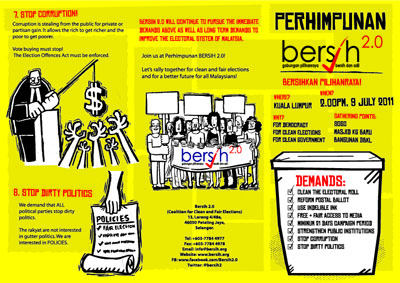Hack:
Dear management, RIP
Malaysians had their "Tahrir Square" moment last Saturday, 9th July 2011 when more than 50,000 people took to the streets of capital Kuala Lumpur demanding electoral reform. To be honest, it was nothing like the Arab uprising. But in a country where public protest is rare, and considering government’s overzealous responses using archaic law to justify state arrests, distributing fear and even placing the capital city into a police lock-down, it did not intimidate people by the thousands to rally that day, braving the elements and aggressive police opposition to voice their civil opinion.
But the rally is not only a statement of intent that seeks to uphold the spirit of the nation’s Constitution. It is also an interesting social experiment where the Internet particularly Web 2.0 platforms such as Facebook and Twitter become enablers, not only as alternative to the controlled mainstream media but also as means of organizing, perhaps in the fashion that have become all too familiar to the youths in Tunisia, Egypt and Syria nowadays. It is also an experience that is leading us to a troubling confirmation that in our search for a more a better “human technology”, the Internet has become more and more of a tool for democracy while becoming less and less relevant to the practice of management. It is even more troubling considering the value of the Internet such as freedom, creativity and meritocracy which all are essentially compatible with democracy is often at odd with the planning and controlling nature of management. And with the Internet becoming more pervasive in the organization, democracy will soon dominate the workplace agenda. Internet’s latest version 2.0 could very well be the beginning of the end for management as we know it today. This is certainly ironic because it took the effort of the enterprising firms that are built on sophisticated management processes to deliver organized Internet platform to the public. Now that very same Internet is threatening to make management irrelevant! But democracy, being core to free market principle and having done so many good to our world, should be encouraged. And if advancing democratic values require us to sacrifice the ideals of management, then so be it.
The problem with democracy is that it is messy and inefficient. While democracy enhances meaningful participation from every angle, it can create seemingly endless debate that may threaten actual progress. Case in point will be the debt ceiling debate in the United States. It is democracy in its best, really! But should the debate go any further, it will definitely roil financial markets all over the world. To arrive to a solution, democracy can be painstakingly slow. This is where it needs to be strengthened in which management, built on decades of research and articulation can contribute. If there is such a thing called management 2.0, it will be to redirect the strengths of management 1.0 to make democracy efficient and productive.
To fully leverage Internet capabilities, it does make sense for the organization to behave more like a democracy. Unfortunately governments are not the best of example of democracy at work. So can companies create a better democracy instead?
Perhaps organizations such as Google are already showing us the way. Or perhaps some obscure start-ups somewhere are already experimenting. What is certain is that Web 2.0 has already created the avenue for democracy to flourish by allowing interactivity amongst individuals to become more social and building collective wisdom through crowdsourcing. The key is to ensure that democratic activism can continue to happen in real-time, without filter and disruption. In a way, Web 2.0 is giving companies the right opportunity to engage democracy in a far active manner than its national parallel and its smaller size should allow everyone to make its presence more felt. Who knows what Web 2.0 will deliver to us in the future? But as long as Web 2.0 and the Internet continue to connect the organization to the marketplace, organization can create a better democracy, perhaps teaching a thing or two on how national democracy should work.
But change must not be done in haste to avoid major disruption to value creation. And like many other effective change management program, organization must first work on the paradigm. The transition to a democratic organization requires us to influence rather than control. No more toeing the line but instead allowing new mix of ideas even encouraging open dissents that form part of the solution. Management 2.0 must therefore focus on institutionalizing a process that will moderate these views into proper meaning.
These are the domain from which management 2.0 can act:
Redefine public relations. Public relations should no longer be about damage control. It should not be limited to products. In fact, it should be at core of things and move beyond common branding and into promoting the democratic ideals that the organization is living. The company’s products must be seen as both an extension and output of the organization democratic belief and the public relation function must actively engage the marketplace to explain and protect such ideals while managing feedback.
Language upskilling. When there are only 140 blank spaces that you can use to write, your message depth is definitely limited. It is the reason why organization must unlearn and relearn the ability to craft an effective message. If its words are to be an impetus to bigger and greater things to come, the organization must know and use the right words that can energize community of passion.
Demography, demography, demography. There is a demographic aspect to management reinvention. The Internet has brought to our youths the kind of wisdom that is more rich and more real-time than what can possibly be amassed in a lifetime. If there is one area where management should be reinvented, it will be the way our organization is structured by bringing our brilliant and talented youths to occupy organization’s C-suites today rather than later. The current elders should become just that, playing an elderly role, providing temperament and emotional guidance. The youth leadership must not be underestimated and it is not mere coincidence that many of today’s trend-setting organizations and potential democracy hotspots are powered and led by youths. Unless organization becomes more accommodative in changing it leadership composition, there is a high chance we will miss the next Brin, Page or Zuckerberg.




You need to register in order to submit a comment.